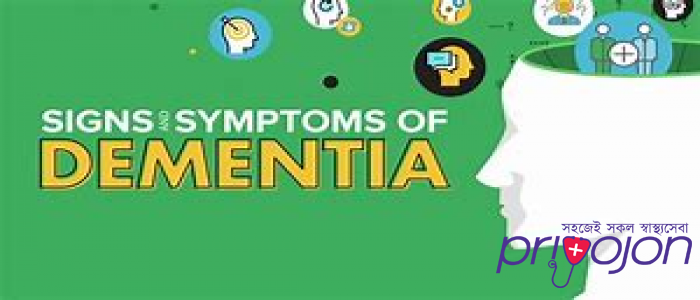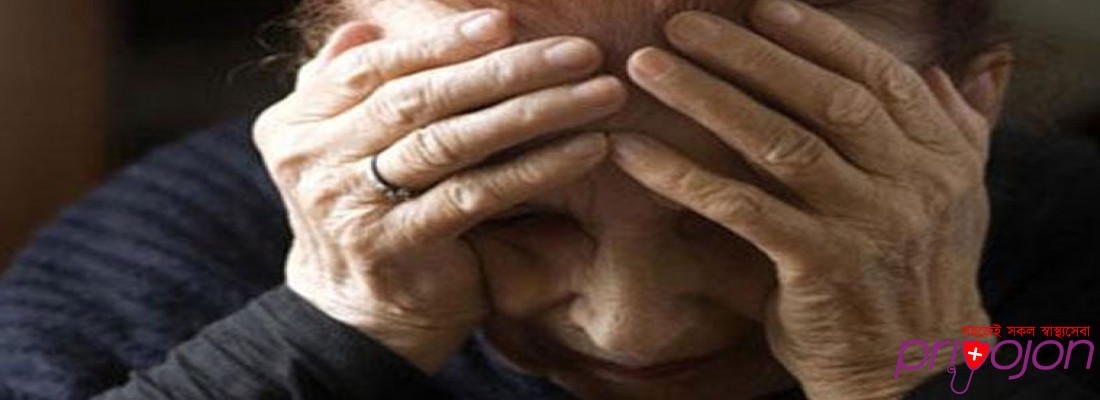
Overview
Medically reviewed by Dr. Rabeya Afroz Shomi
What is dementia?
The word ‘dementia’ describes a set of symptoms that may include memory loss and difficulties with thinking, problem-solving or language.
These changes are often small to start with, but for someone with dementia they have become severe enough to affect daily life.
A person with dementia may also experience changes in their mood or behaviour.
Dementia is caused when the brain is damaged by diseases, such as Alzheimer’s disease or a series of strokes. Alzheimer’s disease is the most common cause of dementia, but not the only one.
The specific symptoms that someone with dementia experiences will depend on the parts of the brain that are damaged and the disease that is causing the dementia.
Symptoms of dementia
The different types of dementia tends to affect people differently, especially in the early stages. Other factors that will affect how well someone can live with dementia include how other people respond to them and the environment around them.
A person with dementia will have cognitive symptoms (to do with thinking or memory). They will often have problems with some of the following:
- day-to-day memory – for example, difficulty recalling events that happened recently,
- concentrating, planning or organising – for example, difficulties making decisions, solving problems or carrying out a sequence of tasks (such as cooking a meal),
- language – for example, difficulties following a conversation or finding the right word for something,
- visuospatial skills – for example, problems judging distances (such as on stairs) and seeing objects in three dimensions,
- orientation – for example, losing track of the day or date, or becoming confused about where they are.
A person with dementia will also often have changes in their mood. For example, they may become frustrated or irritable, apathetic or withdrawn, anxious, easily upset or unusually sad. With some types of dementia, the person may see things that are not really there (visual hallucinations) or strongly believe things that are not true (delusions).
What causes dementia?
-
Alzheimer’s disease – This is the most common cause of dementia. In Alzheimer’s disease, an abnormal protein surrounds brain cells and another protein damages their internal structure. In time, chemical connections between brain cells are lost and cells begin to die. Problems with day-to-day memory are often the first thing to be noticed, but other symptoms may include difficulties finding the right words, solving problems, making decisions, or perceiving things in three dimensions.
-
Vascular dementia – If the oxygen supply to the brain is reduced because of narrowing or blockage of blood vessels, some brain cells become damaged or die. This is what happens in vascular dementia. The symptoms can occur suddenly, following one large stroke. Or they can develop over time, because of a series of small strokes. Vascular dementia can also be caused by disease affecting the small blood vessels deep in the brain, known as subcortical vascular dementia. The symptoms of vascular dementia vary and may overlap with those of Alzheimer’s disease. Many people have difficulties with problem-solving or planning, thinking quickly and concentrating. They may also have short periods when they get very confused.
-
Mixed dementia – This is when someone has more than one type of dementia, and a mixture of the symptoms of those types. It is common for someone to have both Alzheimer’s disease and vascular dementia together.
-
Dementia with Lewy bodies – This type of dementia involves tiny abnormal structures (Lewy bodies) forming inside brain cells. They disrupt the chemistry of the brain and lead to the death of brain cells. Early symptoms can include alertness that varies over the course of the day, hallucinations, and difficulties judging distances. A person’s day-to-day memory is usually affected less than in the early stages of Alzheimer’s disease. Dementia with Lewy bodies is closely related to Parkinson’s disease and often has some of the same symptoms, including difficulty with movement.
- Frontotemporal dementia (including Pick’s disease) – In frontotemporal dementia, the front and side parts of the brain are damaged. Clumps of abnormal proteins form inside brain cells, causing them to die. At first, changes in personality and behaviour may be the most obvious signs. Depending on which areas of the brain are damaged, the person may have difficulties with fluent speech or forget the meaning of words.
The symptoms of these types of dementia are often different in the early stages but become more similar in the later stages. This is because more of the brain is damaged as the different diseases progress. In the later stages of dementia, the person will need more and more support to carry out everyday tasks.
However, many people with dementia live well for years after their diagnosis. Information, advice and support are available for the person and their carer to help them live well with dementia.
Who gets dementia?
Dementia mainly affects people over the age of 65 (one in 14 people in this age group have dementia), and the likelihood of developing dementia increases significantly with age.
However, dementia can affect younger people too. There are more than 42,000 people in the BD under 65 with dementia.
What are the risk factors for dementia?
If you, or someone you know, has developed dementia, it is natural to ask why. It is not usually possible to say for certain, although a doctor may be able to say which factor(s) might have contributed. In most cases a mixture of risk factors – potentially avoidable and not – will be responsible.
How can I tell if I have dementia?
Many people notice that their thinking gets a bit slower or their memory becomes a bit less reliable as they get older – for example, they might occasionally forget a friend’s name. These symptoms can also be a sign of stress, depression or certain physical illnesses, rather than dementia.
What are the symptoms of dementia?
Some symptoms may point to dementia if you have become significantly more forgetful to the extent that it is affecting your daily life. This is especially true if you:
- struggle to remember recent events, although you can easily recall things that happened in the past,
- find it hard to follow conversations or programmes on TV,
- forget the names of friends or everyday objects,
- struggle to recall things you have heard, seen or read recently,
- regularly lose the thread of what you are saying,
- leave objects in unusual places (eg keys in a bathroom cabinet),
- have problems thinking and reasoning,
- feel anxious, depressed or angry,
- feel confused even when in a familiar environment or get lost on familiar journeys,
- find that other people start to comment on your forgetfulness.
Diagnosing dementia
Problems with your memory may be caused by a treatable condition such as depression or an infection, rather than dementia. Finding out the cause may allow the person to get the right treatment.
If these problems are because of dementia, getting a diagnosis has many benefits. It provides someone with an explanation for their symptoms, gives them access to treatment, advice and support, and allows them to prepare for the future and plan ahead. Knowing the type of dementia (for example, Alzheimer’s disease or vascular dementia) is also important, partly because it may allow the person to get an appropriate drug treatment.
Treatments for dementia
Care and support for someone living with dementia should always be ‘person-centred’. This means it should be focused on that person and their individual needs and preferences.
Non-drug treatments and support
There are a range of non-drug treatments available that can help someone to live well with dementia. These include information, advice, support, therapies and activities. The GP, memory service or local Alzheimer’s Society are good places to start for more information on what is available.
Support for the person and their carer should be available after a diagnosis. This should give them the chance to talk things over with a professional, ask questions about the diagnosis, and think about the future. It’s also important to get information on planning ahead, where to get help with this and how to stay well, both physically and mentally. Other types of treatment include the following:
- Talking therapies, such as counselling, can help someone come to terms with their diagnosis or discuss their feelings.
- Cognitive behavioural therapy (CBT) may be offered if the person develops depression or anxiety.
- Cognitive stimulation therapy is a popular way to help keep someone’s mind active. It involves doing themed activity sessions over several weeks.
- Cognitive rehabilitation can enable an individual to retain skills and cope better. There is also lots that can be done at home to help someone with dementia remain independent and live well with memory loss. Support ranges from devices such as pill boxes or calendar clocks to practical tips on how to develop routines or break tasks into simpler steps.
- Many people with dementia enjoy life story work, in which the person is encouraged to share their life experiences and memories. As a person’s dementia progresses, the may also enjoy reminiscence work. Such activities may help improve someone’s mood, wellbeing and mental abilities.
- Other popular activities include music, singing or art. It is vital that people with dementia stay as active as they can – physically, mentally and socially. Taking part in meaningful activities is enjoyable and leads to increased confidence and self-esteem.
Can dementia be prevented?
It is not usually possible to say for sure why a particular person has developed dementia. Ageing is the biggest risk factor for dementia and can't be changed. There are however lots of things you can do to reduce your risk.
What risk factors can we change?
Factors such as high blood pressure, lack of physical exercise and smoking – all of which lead to narrowing of the arteries – increase the risk of developing Alzheimer’s disease and vascular dementia. There is evidence that a healthy lifestyle, especially in mid-life, can help reduce the risk of dementia. Regular physical exercise (for example, cycling, swimming, brisk walking), maintaining a healthy weight, not smoking, and drinking alcohol only in moderation, if at all, are linked to a reduced risk of dementia.
A healthy balanced diet also helps to reduce a person’s risk. A balanced diet is one which is low in saturated fat, does not have too much salt, sugar or red meat, and includes plenty of fish, starchy foods, and fruit and vegetables. All these healthy lifestyle choices will also reduce the risk of other serious conditions such as stroke, heart disease and cancer.
A person who is already living with conditions such as diabetes, heart problems, high blood pressure or high cholesterol should follow professional advice to keep their condition under control. Getting depression treated early is also important.
It also seems that keeping mentally and socially active into later life may help lower a person’s risk of dementia. Being mentally active could include doing puzzles or reading, or learning a new skill. Being socially active could include visiting friends or going to a place of worship. Volunteering could offer both mental and social activity and many organisations offer opportunities for people looking to donate their time or skills.



